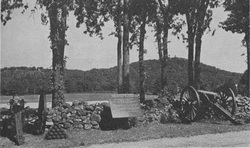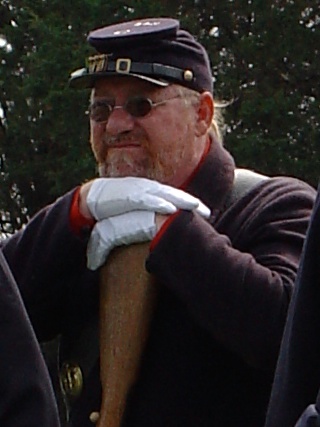
We’re standing at the wall, when we heard their spirits call. Whatever happened to our Fame? We never left this place, for we would not be disgraced, there were no medals for our slain. A defiant battle cry, they held their colors high and for America they fell. Upon this sacred ground they laid their brothers down as faithful soldiers here they held. So raise your glasses high for the boxwood and the green. Here’s to the memory of O’Kane; To Bradley and McShaa, they are heroes to our brave, the “Rock of Erin” is their name.
This is what we did on the 3rd of July 2013. We sang in their honor; the songs the boys would have sung in camps or wherever they may have been with the Army of the Potomac. It was a hard life, walking almost everywhere an army of 150,000 men would have gone. They followed the enemy as it crisscrossed over the Virginia and Carolina countryside. This day however we formed up at the Rupp House, we read the names of all the men who were present on July 2nd and 3rd. Then we walked from the Rupp House in downtown Gettysburg, one mile down the Emittsburg Road to the National Park grounds to where the 69th PA Irish were positioned. A nice crowd of about 200 visitors was still on hand as they saw us marching along Hancock Avenue toward that 180-foot position along the stone wall. We stood at the Wall. At this spot 150 years ago 283 men would hold the line and make their legacy known. When the fighting had ceased 137 more men were casualties of this long and horrible war… The first paragraph is a verse of a song we sing in honor of those brave men who would not give up their place in the fight for freedom and liberty of all men. They fought against a way of life they believed was contrary to the will of God. No man is better than the next. It doesn’t matter about education. It only matters that we are free enough to pursue any path we feel fits our needs. They could see the tyranny of the southern hierarchy. They believed they knew where this was heading and they didn’t want this for their new adopted homeland spoiled this way. Baptism in blood was the only way to cleanse and defeat such tyranny.
They probably didn’t know what Thomas Jefferson had said during the birth of our nation. Quote: “The tree of liberty, from time to time, must be replenished with the blood of patriots and tyrants.” They did know what the abuse of citizen and common folks from their former homes across the big pond. Their feelings remained very strong and bitter.
After two days of bitter fighting on the 1st and 2nd of July 1863 the fighting would finally come to a single charge across an open field of about a mile in distance. Pickett, Pettigrew and Trimble lined up their men. The artillery thought they had done their work, but it fell far short of what they had thought it to do. When nearly 15,000 men are coming toward you, with the intent of doing you harm, you’re scared. Any man who tells you different is a fool. We can only imagine what they felt. I can tell what we felt. We were in awe of these numbers of men who just kept coming. They seemed endless in their procession; all the time falling on deaths threshold. Each step becoming ever more difficult to make, yet still they came. The few who did make it to the wall were either captured or mortally wounded or killed. The rest hobbled back to their lines, some willing to give it another chance. We almost made it; we could have made it. Just give us the men to try again. But the answer from General Lee was, “No, it is all my fault. We will rest and fight another day.”
The defeated rebels wouldn’t do that this day. For another week their army would try to get back to their home state of Virginia. Many small battles would follow this tragic event in southern history. The rains came and cleansed the ground of the blood that had drenched it for those three days in July, 150 years ago. The rain, however could not cleanse the air of all the dead men and horses that still spotted the landscape for days and weeks after the battle.
Time alone would heal this small crossroad town. It would take its rightful place in the history of our nation. Now millions travel to the site of the largest land battle in the history of our country. Tourists and veteran living historians get to see the ground these men fought on and to hear their stories. The stories they themselves have written on the nearly 1,400 markers that appear on these now peaceful hill.
I’ve been there so many times and yet I still learn something new each time. Each Remembrance Day, the weekend closest to November 19th we gather to celebrate their lives and the sacrifice they paid for freedom. I can never fully appreciate what these men did on these fields. We can only in our vain way try. We can only show our children the sacrifice they made on July 1-2-3 of 1863.
Image source: nps.gov
This is what we did on the 3rd of July 2013. We sang in their honor; the songs the boys would have sung in camps or wherever they may have been with the Army of the Potomac. It was a hard life, walking almost everywhere an army of 150,000 men would have gone. They followed the enemy as it crisscrossed over the Virginia and Carolina countryside. This day however we formed up at the Rupp House, we read the names of all the men who were present on July 2nd and 3rd. Then we walked from the Rupp House in downtown Gettysburg, one mile down the Emittsburg Road to the National Park grounds to where the 69th PA Irish were positioned. A nice crowd of about 200 visitors was still on hand as they saw us marching along Hancock Avenue toward that 180-foot position along the stone wall. We stood at the Wall. At this spot 150 years ago 283 men would hold the line and make their legacy known. When the fighting had ceased 137 more men were casualties of this long and horrible war… The first paragraph is a verse of a song we sing in honor of those brave men who would not give up their place in the fight for freedom and liberty of all men. They fought against a way of life they believed was contrary to the will of God. No man is better than the next. It doesn’t matter about education. It only matters that we are free enough to pursue any path we feel fits our needs. They could see the tyranny of the southern hierarchy. They believed they knew where this was heading and they didn’t want this for their new adopted homeland spoiled this way. Baptism in blood was the only way to cleanse and defeat such tyranny.
They probably didn’t know what Thomas Jefferson had said during the birth of our nation. Quote: “The tree of liberty, from time to time, must be replenished with the blood of patriots and tyrants.” They did know what the abuse of citizen and common folks from their former homes across the big pond. Their feelings remained very strong and bitter.
After two days of bitter fighting on the 1st and 2nd of July 1863 the fighting would finally come to a single charge across an open field of about a mile in distance. Pickett, Pettigrew and Trimble lined up their men. The artillery thought they had done their work, but it fell far short of what they had thought it to do. When nearly 15,000 men are coming toward you, with the intent of doing you harm, you’re scared. Any man who tells you different is a fool. We can only imagine what they felt. I can tell what we felt. We were in awe of these numbers of men who just kept coming. They seemed endless in their procession; all the time falling on deaths threshold. Each step becoming ever more difficult to make, yet still they came. The few who did make it to the wall were either captured or mortally wounded or killed. The rest hobbled back to their lines, some willing to give it another chance. We almost made it; we could have made it. Just give us the men to try again. But the answer from General Lee was, “No, it is all my fault. We will rest and fight another day.”
The defeated rebels wouldn’t do that this day. For another week their army would try to get back to their home state of Virginia. Many small battles would follow this tragic event in southern history. The rains came and cleansed the ground of the blood that had drenched it for those three days in July, 150 years ago. The rain, however could not cleanse the air of all the dead men and horses that still spotted the landscape for days and weeks after the battle.
Time alone would heal this small crossroad town. It would take its rightful place in the history of our nation. Now millions travel to the site of the largest land battle in the history of our country. Tourists and veteran living historians get to see the ground these men fought on and to hear their stories. The stories they themselves have written on the nearly 1,400 markers that appear on these now peaceful hill.
I’ve been there so many times and yet I still learn something new each time. Each Remembrance Day, the weekend closest to November 19th we gather to celebrate their lives and the sacrifice they paid for freedom. I can never fully appreciate what these men did on these fields. We can only in our vain way try. We can only show our children the sacrifice they made on July 1-2-3 of 1863.
Image source: nps.gov

 RSS Feed
RSS Feed
